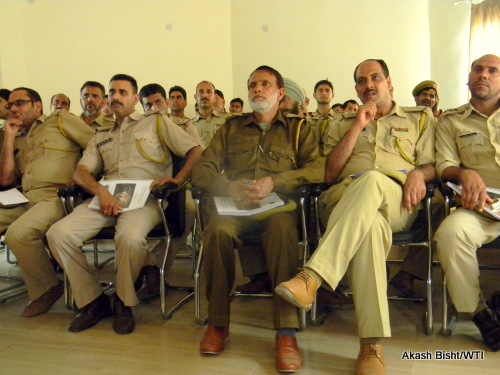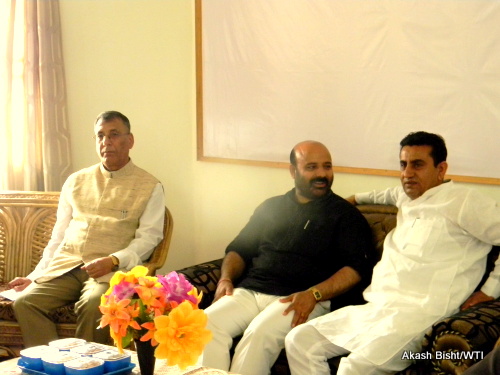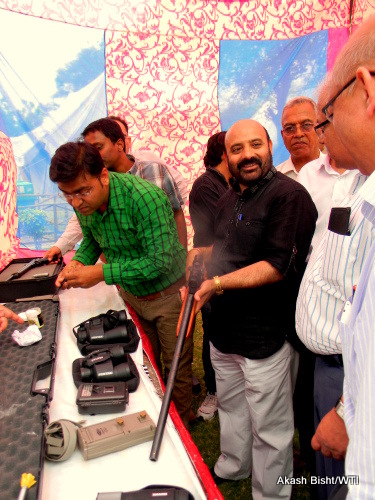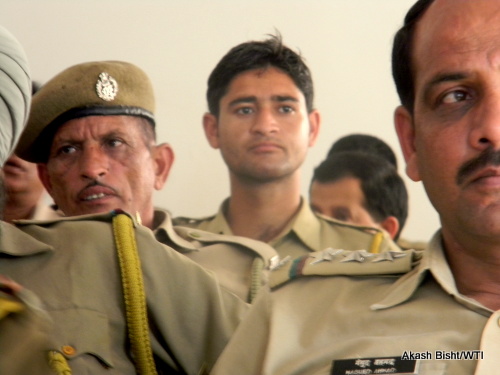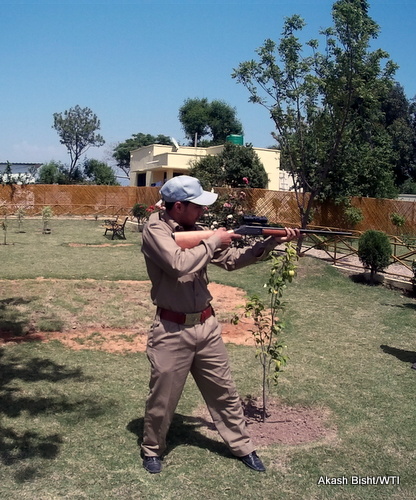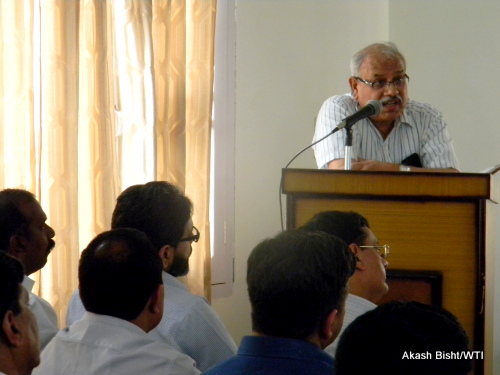First ever training workshop for J&K field staff on conflict management
Jasrota, April 22, 2015: Twenty two year old Mukesh Kumar has just joined the forest service as a forest guard in the Ramban Division of the Jammu and Kashmir Forest Department. Bachelor in Science, this young boy dreams of becoming one of the top officials in the Forest Department. “I will give all the exams needed to achieve that,” he said. WTI team caught up with him when he had come to attend a training workshop on human wildlife conflict for the frontline forest staff of the state. For the first time in the state, WTI in collaboration with the state Forest Department conducted a three-day training workshop from April 20-23, 2015, for the state forest staff on Human Wildlife Conflict Mitigation at the Wildlife Training Centre at Jasrota in Kathua, Jammu. The workshop aimed to find solutions on handling conflict situations that have seen an exponential rise in the state in the last decade or so.
During a presentation made by Dr Rahul Kaul, Chief Ecologist, WTI, on the Eastern Swamp Deer Translocation Project in Assam, Mukesh’s eyes were glued onto the screen. He was listening to every word that Dr Kaul said with a child-like curiosity. And finally, when a small video clip of deer being released in Manas was played, Mukesh couldn’t hide his emotions and was ecstatic on seeing these deer run into the temporary enclosure built for these animals.
“I am a student of science and well aware of how our environment in under duress owing to increasing anthropogenic pressure. I am aware of how deforestation is triggering climate change and why these wild animals are being forced to move out of the jungles in search of food. I wanted to be in service of nature and that is how I got into this job. I will do my masters later and then Phd,” he said.
In the last decade, more than 216 people have succumbed to wildlife conflict in the state while more than 2395 have been injured by wild animals. Primarily, it is the leopards and bears that are known to injure or kill humans while monkeys, wild boars, nilgais are known to cause severe crop damages. The human mortalities in case of bears are far lesser as compared to that of leopards, but bears do injure a significant number of people in the state. Despite many corrective measures taken by the state Forest Department, conflict cases are on a rise.
It is for this very reason that capacity building of frontline forest staff had become pertinent for the well-being of not only humans, but also wild animals. Such has been the impact of these rising conflict occurrences that Shri Bali Bhagat, Honble Minister for Environment and Ecology, had to assure the legislators on the floor of the State Assembly that the situation would be dealt with sincerity. This training workshop was a result of that assurance and for that 40 frontline staff from Jammu division were chosen for capacity building.
During the course of the training, participants were trained on different facets of conflict mitigation which included an introduction to the wildlife of the state, the conflict animals, dynamics of human-wildlife interactions, understanding conflict through animal’s perspective, preventive and reactive strategies, community engagement, permission for eliminating conflict animals and several field exercises. The training batch of 40 included 20 from the Territorial Divisions from the high conflict areas, 12 inspectors/guards from the Forest Protection Force and eight from the Wildlife Division. During the three-day training programme 40 field functionaries of different wings of the Forest Department from Jammu Division were given orientation by the experts from WTI to deal with the man-animal conflicts in the State.
The training workshop was inaugurated by Shri Bali Bhagat, who in his inaugural address said, “We shouldn’t take conflict cases lightly and need to ensure that conflict cases come down to zero. I am happy that field staff from Wildlife Department, Forest Protection Force and Forest Department has all been included in this workshop. With such trainings, we would be able to bring about some change.” He added that he will speak to higher authorities in the police department and ensure that police force is also trained on how to handle conflict situations. The inaugural session was attended by the Mr. AK Singh, PCCF; Mr. Deepak Khanna, CWLW; Mr. Roshan Jaggi CCF/RWLW Jammu; Mr Rajiv Jasrotia, MLA, Kathua; Dr Jagdish Kishwan, Chief Advisor, WTI; among others.
Speaking after the minister, Mr Rajiv Jasrotia spoke at length on the reasons that have led to increase in conflict numbers. He made several suggestions, including planting fruit bearing trees in the forest so that bears and monkeys don’t come out in search of food. “Deforestation is one of the major issues here and that is the reason why animals are venturing out of the forests. We need to have debates/discussions/seminars on this issue and locals and Forest Department participation is very crucial in addressing conflict situations,” said Mr Rajiv Jasrotia.
The first day also saw Mr AK Singh, PCCF, J&K, stressing that the workshop would be an enriching experience for the trainees and said, “We hope to continue to train the frontline staff since our forest staff needs to know how to handle not only animals but also humans in such conflict situations. This should continue and we will try to incorporate poaching and control of other wildlife crimes into the training module later.”
Adding to that, Mr. Deepak Khanna, CWLW, suggested that the awareness levels amongst locals living near protected areas should be higher than others. “We should first focus on areas where conflict is on the rise and for that we can promote eco-tourism in these areas so that people become stakeholders in saving the wildlife and do not see these wild animals as threats or problem animals.”
Speaking to the participants, Dr Jagdish Kishwan, emphasised on finding workable solutions on how to handle conflict situations. He cited several experiences on how the conflicts are addressed and said, “We need to adopt a holistic approach to strike a balance between human and wildlife welfare. And, I am sure that more such trainings will be conducted in future to ensure that the Forest Department in the state is efficiently geared to handle conflict situations.”
The three-day training concluded with a host of field exercises that included using camera traps, identifying animal signs, using dart guns, among others. A session on the necessary permissions required for eliminating conflict animals and the preparation of compensation case was also part of the training module. The last day saw participants enjoying the field exercise and narrating how this training exercise has helped them understand many dimensions of human-wildlife conflict. Dr Rahul Kaul in his concluding remarks added that participation of communities in cases of conflict is the need of the hour. “We need to make communities as the most important stakeholder in handling conflict situations, which is the future of conservation. If villagers become stakeholders, there are greater chances of humans and wildlife coexisting in harmony, otherwise we would continue to lose both humans and wild life,” he added.
The last day of the training saw certificates being distributed by Shri Roshan Jaggi, CCF/RWLW, Jammu, who was overwhelmed with the response of the participants. When he asked whether they have learnt anything new through the training, the participants responded with a loud yes. “People say that animals are coming out because their numbers have increased. Have we ever given a thought on the increase in human population and whether these urban areas can sustain them? Therefore, your job during a conflict situation is to take locals into confidence and handle it in such a way that there is no harm to either humans or animals,” he said.
Meanwhile, on the last day of the training, Mukesh Kumar is thrilled with the training and promises to implement these suggestions on ground. He gives assurances of sharing these anecdotes with his other colleagues who were not part of this training exercise. Before he leaps on to the back of a vehicle, he bids adieu and guarantees to keep the interests of man and animal in focus in such crisis situations. “If more and more young people are employed in the Forest Department and given such extensive training, I am sure that we will be able to bring about a change,” he concluded.


